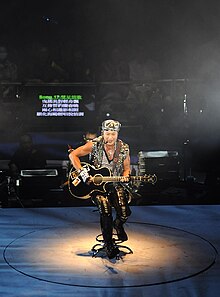From Wikipedia, the free encyclopedia
| Samuel Hui | |
|---|---|
 | |
| Background information | |
| Chinese name | 許冠傑 (traditional) |
| Chinese name | 许冠杰 (simplified) |
| Pinyin | Xǔ Guànjié (Mandarin) |
| Jyutping | Heoi2 Gun3git6 (Cantonese) |
| Born | 6 September 1948 (age 69) Xiguan, Guangzhou, China |
| Other names | Brother Sam |
| Occupation | Musician singer songwriter record producer actor |
| Years active | 1967–92 2003–present |
| Genre(s) | Cantopop, Hong Kong English pop |
| Instrument(s) | Vocals guitar harmonica violin piano sanxian drums |
| Voice type(s) | Tenor |
| Associated acts | The Lotus |
| Spouse(s) | Rebecca Hui (m. 1972) |
| Children | 2 |
| Parents | Hui Sai-cheung (father) Lee Sin-wan (mother) |
| Ancestry | Panyu, Guangdong |
| Influenced by | Elvis Presley, The Beatles |
| Influenced | Beyond, Alan Tam, Leslie Cheung, Albert Au, Jacky Cheung |
| [show] Awards | |
This is a Chinese name; the family name is Hui.
Samuel Hui Kwun-kit (born 6 September 1948), usually known as Sam Hui, is a Hong Kong musician, singer, songwriter and actor. He is credited with popularising Cantopop both via the infusion of Western-style music and his usage of vernacular Cantonese rather than written vernacular Chinese in biting lyrics that addressed contemporary problems and concerns. Hui is considered by some to be the first major superstar of Cantopop, known as the God of Song.
Hui graduated from the Faculty of Social Sciences of the University of Hong Kong, Ying Wa College and St. Francis Xavier’s College in the late 1960s and early 1970s. Hui and his two older brothers, Michael and Ricky, worked on several comedies in the early 1970s. Hui has also gained credit for popularising Cantopop, by incorporating the idiosyncrasies of Western popular music into the old Cantopop genre.
Hui started his career as a host on a youth music TV show on the TVB network. Sam and Michael Hui starred as the hosts in Hui Brothers Show (雙星報喜). At that time, he was the lead musician of a band The Lotus. In the early years of his career, Hui performed English songs that were popular in Britain and the United States. He wrote the theme songs for the comedies produced by his brother, Michael Hui, and started performing Cantonese songs.
Hui’s music gained popular appeal, particularly with the working class, for its simplicity and the relevance of the lyrics. A prolific songwriter, a noted recurring theme in his music is that it often describes or humorously satirises Hong Kong society and events. One of his most popular songs during the mid-1970s was the theme song of the film The Private Eyes, which humorously reflected on the harsh realities of middle and lower-income Hong Kongers. Others such as “Song of Water Use” (制水歌), which referenced the days of water rationing during the 1960s, and “Could Not Care Less About 1997” (話知你97), which encouraged Hong Kong people to adopt a carpe diem attitude instead of worrying about the imminent handover to the People’s Republic of China on 1 July 1997, were more topical in nature and referenced local events.
While some of his songs are lighthearted, others carried philosophical messages brought out through artful use of Chinese words that have multiple symbolism. Examples can be seen in his farewell song in 1992 and “From the Heart of a Loafer” (浪子心聲), where for Cantopop, sophisticated language and messages are rare in the lyrics of contemporary artists.
- 許冠傑 – Drifter’s Song – 浪子心聲 (英語版本) – Sam Hui
- Sam Hui 许冠杰: 浪子心声/Drifter’s Song (Song with Lyrics, Romanization and English Translations)
- 许冠杰- 光荣引退汇群星(完整版) 1992 Sam Hui retirement show with the stars
Covers of the song
- 张学友 – 浪子心聲 [From the Heart of a Loafer]
- 許冠傑光榮引退匯群星 梅艷芳 葉玉卿 黃錦燊 浪子心聲
- Blind musician Alfred Ho performs Sam Hui’s From the Heart of a Loafer (Long Ji Sam Sing)
- 浪子心声 张德兰
- AI人工智能 邓丽君 跟唱 浪子心聲 – cover 许冠杰
- 许冠杰 浪子心声 Instrumental Karaoke Sam Hui Song of loafer 声生不息 Infinity and beyond
- Drifter’s Song – Sam Hui | Harmonica Cover
- Drifter’s Song 浪子心聲 – Metro Vocal Group
- 林子祥 杜麗莎 – 浪子心聲


































































Comments